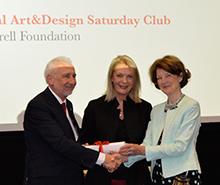Sir Misha Black Award for Innovation in Design Education
Professor James Randle RDI who represents the Royal Academy of Engineering on The Awards Committee, read the citation for The Sorrell Foundation’s National Art&Design Saturday Club:
“Each year we give an award to a British person, team or establishment, whom we judge to be at the forefront in their contribution to the process of teaching design whilst encompassing all of its disciplines from Art to Engineering. We do this to reward those who are making great contributions, but also to encourage others to strive towards the aims and ambitions that drove Misha Black to be the luminary that he was.
This year the Award goes to the Sorrell Foundation for their work in establishing the National Art&Design Saturday Clubs. The Clubs provide young people aged 14 to 16 with specialist tuition in art and design in all its forms at their local colleges and universities entirely without charge.
Saturday Clubs/Classes are not new; they had their beginnings in the forties and fifties and were very successful, influencing very many contemporary artists and designers. The originators of the National Art&Design Saturday Club, John and Frances Sorrell (Newell as she was then) were in fact 14 year old students of the original Saturday Classes themselves. The original classes disappeared in the seventies.
The Sorrell Foundation has a history of contributions to youngsters’ involvement to the teaching of design, having created the very successful JoinedUpDesign for Schools and Myplace programmes. In 2009 John and Frances Sorrell resurrected the Saturday Club, not to be the same, but to be better than the original. The National Art&Design Saturday Clubs were to be more inclusive, more outward looking, linking Schools, Colleges and Universities.
Since its inception, The Sorrell Foundation has relied upon the use of ‘hands-on’ projects in the dissemination of art, craft and design through team work, as was the case with the earlier ‘joinedupdesign for schools’ and ‘MyPlace’ programmes. Those projects were focussed on improving the quality of life through good design in their own environments; setting up client teams of young people who worked with professional architects and designers. This model has been absorbed into the Saturday Club concept.
The Saturday Club takes the young people away from their normal school environment to be taught by experienced practitioners and dedicated teaching staff from the host colleges and universities; learning about design in all its forms: product, vehicle, fashion and digital design as well as art and craft.
The programme is aimed particularly at the 14 to 16 age group in order to capture the young peoples’ interest before they make life-changing decisions about study and careers. The Saturday Club nurtures talent and builds confidence whilst raising aspirations. It helps young people gain qualifications and gives them an insight into studying at college or university and an understanding of careers in creative industries.
Tutors in each of 33 Colleges and Universities recruit youngsters from their local schools in addition to those from their own establishments; each cohort has, therefore, club members from a wide academic background. The students work in a competition free environment where each can contribute and learn whilst making new friendships and being exposed to practitioners skills ranging from the traditional and even ancient to the latest computer based technologies, often blending them to produce new and innovative design. These are highly exploratory experiences for young minds. In 2013-14 Club members were learning from around 60 different disciplines across Art and Design. Much of this experience sharing is driven by the local teaching staff, whose dedication is a delight to observe.
The Sorrell Foundation has only a small staff of half a dozen or so very dedicated and enthusiastic people; it delivers the National Art&Design Saturday Clubs though a network of tutors in 33 Colleges and Universities and the V&A Museum. The tutors are assisted by undergraduate students, offering an approachable environment to the youngsters they are coaching in which creative minds can flourish.
Although the classes are free, the youngsters are not given a free ride, they have, in effect, to sign up for thirty, three to four hour session a year; a significant undertaking for a single year but I met several that were in their third year, a clear indication of the programmes’ popularity with the target audience.
Additionally, The Sorrell Foundation arranges a London visit each year, with a pop-up exhibition of all Club members’ self-portraits, combined with visits to major Art Galleries and Museums in the city of London; for many it is the first time they have been to London. The visit also generates an interest in, and an understanding of, the contribution that Art and Design has made to the development of this country’s culture and prosperity; it is after all the case that 8% of British exports are based upon our invention, innovation and creativity.
The Sorrell Foundation does not stop there, for it also recognises that opening doors must also include allowing Club members to meet some of the best known and most successful designers and design organisations. To this end, each year, a Master-Class is organised for every one of Clubs at their own establishment. No small undertaking for such a small management team, particularly since none of the Master-Classes are repeats.
At the end of each year The Sorrell Foundation hosts a show at Somerset House, where every Club members’ work is put on show, a great event, not only for the Club members and their families and friends, but also for the general public and commercial interest. For most of the students this will be the first time that their work will have come under critical review and is often as proud a moment for the parents as it is for the youngsters themselves.
It has been a delight for me to experience this programme and the wonderful dedication and enthusiasm that has been developed and seems set to grow. Although this award is being made to the Sorrell Foundation I think it is also showing recognition to the hundreds of terrific Programme Leaders, Tutors, Student Assistants and the Students themselves that are delivering this programme. And here again are the very impressive numbers.
In 2013 there were 33 Colleges and Universities, 280 Schools, 225 Tutors, 400 Teachers, 110 Student Assistants, 90 Artists Designers and Architects. Created only five years ago, the numbers of Saturday Club members has grown exponentially since 2009, reaching 735 in 2013, 950 this year and targeted at 1500 in 2016 and 2000 beyond that.
I now call on Mary Mullin to present the Sir Misha Black Award for Innovation in Design Education to Sir John and Lady Frances of The Sorrell Foundation.”
Photograph copyright ©Misha Black Awards/Gloria Ceballos

Presentation of the Sir Misha Black Award




